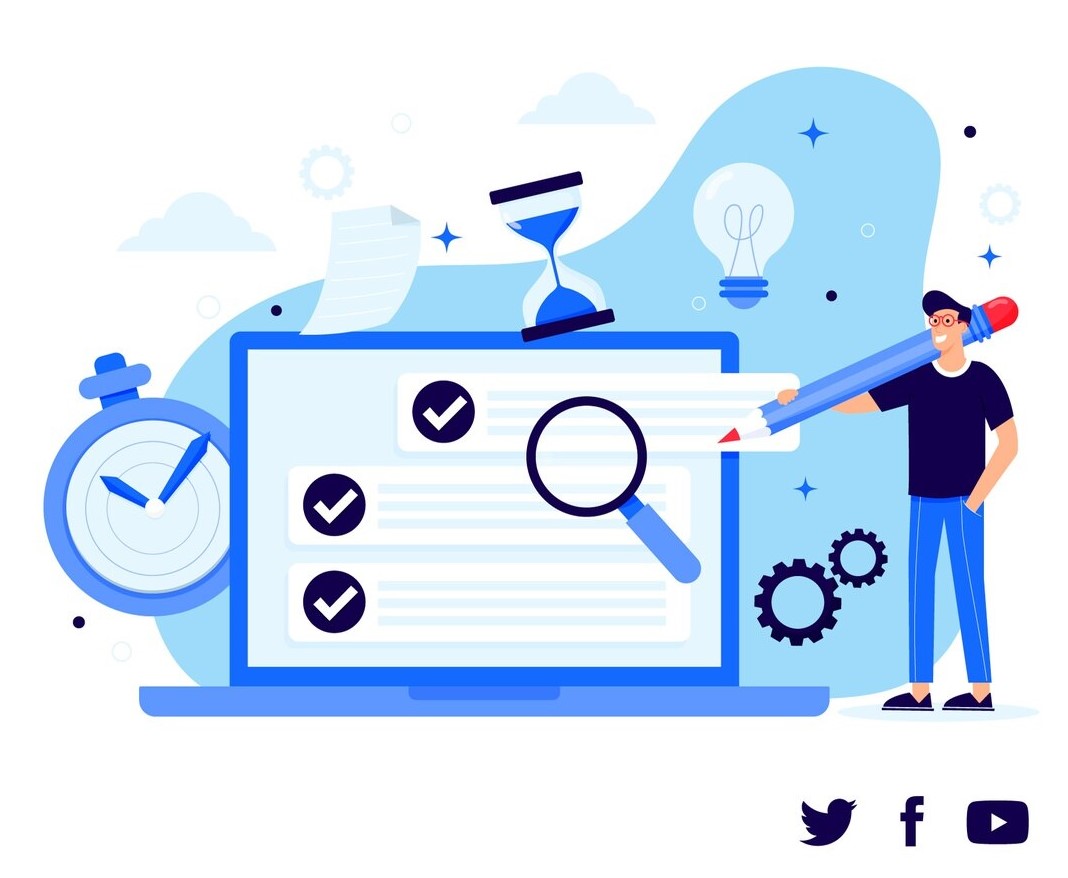How long does a background check take?

How Long Does Background Check Take?
Hiring a new employee can be a long screening process, and one of the most important steps is the background check. But how long does it actually take to complete a pre-hire background check?
The time frame can vary based on several factors according to red flags on a background check, type of background check being done, the complexity of the search, and any delays in processing.
In this blog, we’ll explore the different types of background checks, reasons why they might take longer, and tips to help speed up the process while ensuring thorough vetting and effectively screening potential candidates.
What is a Background Check?
A pre-employment background check is a screening process to verify a candidate's qualifications, including education, work history, licenses, and certifications. It may also include criminal record checks, driving history reviews, and social media screening.
These checks help employers make informed hiring decisions, ensure compliance with legal standards, and protect the organization. For sensitive roles or those requiring certifications, the checks may be more extensive, such as verifying security clearances or commercial driving licenses.
The Federal Trade Commission (FTC) outlines the rights of job candidates, ensuring that background checks comply with laws such as the Fair Credit Reporting Act (FCRA).
For most employers, conducting a background check is important to avoid risks and liabilities, ensuring that the candidate is suitable for the role and represents the company’s values.
How Long Does A Background Check Take?

The duration of a background check depends on the type of background check being conducted and the resources involved. On average, most background checks are completed within a few days, but they can extend up to several weeks in certain circumstances.
It typically takes 48 hours to 5 days, depending on the complexity and the agencies involved. Checks requiring extensive research or coordination with external organizations may take longer, though government agencies usually provide consistent timelines. Employers can either wait for the checks to complete before hiring or start onboarding with a conditional offer, keeping potential delays in mind.
For example, if there are hold-ups because of incomplete or incorrect information, the process may take longer.
1) Social Media Background Check
One of the more modern and important checks is the social media background check. This type of background screening looks at a candidate’s online presence to analyze their behavior, views, and whether they align with the company’s brand or values.
Social media checks can highlight potential risks, such as discriminatory language, violent behavior, or risky associations.
A social media background check reviews a candidate's online presence to evaluate their behavior and determine alignment with company values. This check identifies risks such as discriminatory language, violent behavior, or inappropriate affiliations.
- Typical Duration: A few hours to a couple of days.
- Challenges: Reviewing years of social media activity manually can be time-consuming.
Since social media accounts and posts can span across years, AI-powered tools like Ferretly’s social media background screening quickly analyze vast amounts of data.
Our process combines the power of human social media analysts and advanced AI to produce the industry’s most comprehensive reports.
Take advantage of Ferretly’s AI-powered social media background checks. Request a demo today.
2) Identity And Employment Verification
This is a fundamental step in the background screening process. Identity verification checks the authenticity of a candidate’s name, Social Security number, and employment history.
Platforms like the work number allow employers to quickly verify past employment data, minimizing delays that could arise from traditional methods of contacting previous employers.
This fundamental step ensures that the candidate's name, Social Security number, and employment history are authentic.
- Typical Duration: 1–3 days.
- Tools Used: Platforms like The Work Number streamline employment verification, reducing the time compared to traditional methods that require contacting previous employers manually.
- Potential Delays: Incorrect employment data or non-responsive employers can extend the timeline.
3) Criminal Background Checks
Criminal background checks are essential for roles where trust and safety are priorities. Criminal record checks usually take between one to ten working days. However, if there are delays caused by missing or incorrect information, the process might take longer.
In most cases, a national or state-level criminal check is performed, but federal checks can also be requested, which might take longer due to the complexities involved.
These checks are vital for roles prioritizing trust and security, focusing on the candidate’s criminal record at various levels.
- Typical Duration: 1–10 working days.
- Types:
- National or State-Level Checks: Commonly completed faster due to centralized databases.
- Federal Checks: Require additional processing time due to the complexity of retrieving data across multiple jurisdictions.
- Potential Delays: Missing or inaccurate information might necessitate manual verification, extending the process.
4) Credit Background Checks
Credit checks are commonly conducted for roles where financial responsibility is important, such as finance or managerial positions. This process helps employers assess a candidate’s financial stability and responsibility.
Typically, a credit background check can be completed in just a few days, though it may take longer if disputes arise or multiple financial records need verification.
Credit checks are often conducted for positions requiring financial responsibility, such as managerial or finance-related roles.
- Typical Duration: A few days.
- Purpose: Assess the candidate's financial stability by reviewing their credit history and identifying risks like heavy debt or frequent late payments.
- Potential Delays: Disputes or the need to verify multiple financial records may prolong the process.
5) MVR Reports
Motor Vehicle Records, or MVR reports, are often required for positions involving driving, such as delivery drivers or trucking.
An MVR report checks for any driving-related violations, including DUIs or reckless driving, and typically takes a few days to process.
These checks are essential for roles involving driving, such as trucking or delivery jobs.
- Typical Duration: 1–3 days.
- Focus Areas: Driving-related violations, including DUIs, license suspensions, and reckless driving incidents.
- Potential Delays: Issues like incomplete information or slow response times from the DMV may extend the timeline.
6) Professional License & Education Background Checks
Education and professional licenses must be verified to ensure candidates have the required qualifications for their role.
Employers can use services like the National Student Clearinghouse to quickly verify degrees, certifications, and other academic achievements. However, some institutions may take longer to respond, which could delay the overall verification process.
These checks verify the candidate’s qualifications, including degrees, certifications, and professional licenses.
- Typical Duration: A few days to a week.
- Verification Services: Tools like the National Student Clearinghouse help expedite the verification process.
- Potential Delays: Institutions with slower administrative processes or international verifications may take longer to respond.
7) Fingerprint Background Checks
Fingerprint background checks are typically required for government positions or jobs in high-security sectors. These checks, which involve cross-referencing fingerprints with national databases, can take anywhere from a few days to several weeks, depending on the backlog at the processing agency.
Fingerprint checks are typically required for high-security roles or government positions.
- Typical Duration: A few days to several weeks.
- Process: Cross-referencing fingerprints with national databases like the FBI or state law enforcement agencies.
- Potential Delays: High processing backlogs or issues with fingerprint clarity can slow down results.
8) E-Verify Checks
E-Verify is a federal program used to confirm the eligibility of a candidate to work in the United States. This process typically takes a few minutes to a few days. However, if there is an issue with the information provided, the process might extend as it requires additional follow-up.
E-Verify is a federal system used to confirm a candidate's eligibility to work in the United States.
- Typical Duration: A few minutes to a few days.
- Purpose: Matches candidate information against federal records to verify work authorization.
- Potential Delays: Inconsistent data or errors in submitted documentation may require additional follow-up.
9) State Background Check
State background checks focus on verifying a candidate’s criminal history within a particular state. Think convictions in state court cases, such as burglary, disorderly conduct, and other misdemeanors and felonies. Depending on the state's resources and processing speed, this check can take a few days to a couple of weeks.
These checks focus on criminal records within a specific state, including misdemeanors and felonies.
- Typical Duration: A few days to a couple of weeks.
- Focus Areas: State court convictions such as theft, assault, or drug-related crimes.
- Potential Delays: Jurisdictions with limited digital record systems or slower manual processes.
10) Federal Background Check
Like a state background check, a federal background check reviews criminal activity but at the federal level. This report will expose convictions in federal court cases, such as embezzlement, fraud, robbery, tax evasion, and white-collar crimes.
Unlike state checks, federal background checks review criminal records from federal court cases.
- Typical Duration: Several days to a couple of weeks.
- Focus Areas: Federal-level crimes such as embezzlement, tax fraud, or white-collar offenses.
- Potential Delays: The need for extensive research and limited digitization in some regions can extend processing times.
What Are the Reasons a Background Check Might Take a Long Time?
Delays in the background check process can occur for various reasons, some of which are preventable. To avoid delays, candidates should provide accurate information and sign all required release forms. However, certain factors are beyond their control, such as having multiple residences or jobs, lack of digital records, international experience, or name verification issues. Additionally, if multiple candidates are undergoing background checks, the process may take longer as employers wait for all verifications to be completed.
While most background checks are completed within a few days, certain factors can significantly delay the process. Here’s a breakdown of common reasons that might extend the timeline for completing a background check:
1) Incomplete, Outdated, or Incorrect Records and Alias/Multiple Names
- Outdated Information: If a candidate provides outdated phone numbers or addresses, it can lead to verification delays as investigators may need to contact alternate sources.
- Incomplete Records: Missing details, such as incorrect employment dates or incomplete educational credentials, can require additional outreach to verify accuracy.
- Alias or Name Variations: Candidates with common names, previous legal name changes, or multiple aliases may require additional cross-checking to confirm their identity across different records.
2) Social Media and Online Presence Checks
- Manual Screening Challenges: Without advanced tools, manual review of multiple social media platforms such as LinkedIn, Twitter, Facebook, and Instagram can be time-consuming.
- Comprehensive Review Requirements: Companies often look for unlawful activity, violent behavior, intolerance, or explicit content, which requires careful analysis of both recent and historical posts.
- Privacy Restrictions: If accounts are private, the process becomes more challenging, and analysts must rely on publicly available information. Using platforms like Ferretly’s social media screening tool can streamline the process.
3) Employment, Education, and Criminal Record Verifications
- Former Employers: Verifying a candidate’s employment history depends on the response time of previous employers. Smaller companies or those with limited HR resources may take longer to reply.
- Education Verification: Schools, especially international institutions, may have slower processes or be on academic breaks, delaying verification.
- Criminal Record Checks: Requests that span multiple jurisdictions or require detailed record retrieval can encounter slow responses, particularly in regions with less digitized systems. Some records may also require manual searches, which can prolong the timeline.
4) Holidays, Weekends, and Manual Processes
- Holidays: Government offices, schools, and businesses often operate on reduced schedules during holiday seasons, causing delays in processing requests.
- Weekends: Many institutions are closed on weekends, which can result in a backlog of requests when business days resume.
- Reliance on Manual Processes: Background checks requiring manual intervention, such as retrieving physical records or direct phone verifications, are more prone to delays compared to automated systems.
5) Jurisdictional and Regional Differences
- Local Laws and Procedures: Some jurisdictions have unique compliance regulations that require additional steps, such as notarized consent forms or identity verification processes.
- International Verifications: Background checks involving foreign employers, schools, or government agencies can face challenges due to language barriers, differing legal requirements, and slower bureaucratic systems.
- Data Accessibility: In some regions, digital records may be limited, requiring manual or in-person retrieval.
6) High Volume of Requests
- Seasonal Hiring Surges: During peak hiring seasons or large recruitment drives, background check providers may face higher demand, which can extend processing times.
- Agency Capacity Limits: Smaller background check firms with limited resources may struggle to handle increased workloads, leading to delays.
7) Technical or System Errors
- Database Issues: Errors in criminal or employment databases, such as mismatched names or incomplete entries, can require manual correction and verification.
- Outdated Systems: Legacy systems used by some agencies or institutions may not integrate well with modern technology, causing delays.
- Glitches in Third-Party Tools: Software malfunctions or connectivity issues with online platforms can interrupt the background check process, requiring troubleshooting or manual workarounds.

Tips to Make Background Checks More Efficient and Faster
Employers can take proactive steps to streamline the background check process and avoid delays. It’s always best practice to complete pre-employment checks before an employee's start date. Ideally, employers should conduct these checks after making a conditional job offer to the candidate. Here are some tips to expedite the process:
- Use a Reliable Screening Provider: Partnering with a reputable screening provider can help ensure a faster and more reliable background check process.
- Ensure Accurate Candidate Information (Especially Multiple Residences): Ensuring that the candidate provides accurate and comprehensive information from the start helps prevent delays due to discrepancies.
- Pre-Employment Screening: Conduct background checks for candidates early in the hiring process to avoid last-minute delays.
- Automate the Process: Automated systems can significantly speed up verification processes and reduce manual intervention.
- Prioritize Key Checks: Prioritizing crucial checks based on the job’s requirements ensures that the most important aspects are covered first.
- Obtain Signed Consent Forms Early: Getting all necessary consent forms early in the process ensures that screening can begin without unnecessary holdups.
Also Read: The Do's and Don'ts of employment background checks
How Ferretly Helps You Speed Up the Background Check Time Frame
Ferretly uses advanced AI technology to streamline the social media background screening process. By using a background check with AI, Ferretly speeds up analysis and delivers faster, more accurate results. Using a social media screening platform also helps ensure FCRA and EEOC compliance in the hiring process. Ferretly ensures employers get the information they need in a timely manner, usually within 48 hours.
How Long Does a Background Check Take - Frequently Asked Questions
1) What is the longest wait for a background check?
Depending on the type of background check, local and state searches might be completed within a day, while federal searches can take longer, often up to a week or more.
2) Why is my background check taking so long?
Several factors can influence the time it takes for your background check to return, including incomplete data records, varying state regulations, and delays from third parties. Staying proactive and working with reliable screening providers can help mitigate these issues.
3) How long does a PR background check take?
PR applications can take anywhere from a few weeks to several months to process depending on the country and the complexity of the applicant's history.
4) When do employers run background checks?
Employers typically run background checks after making a conditional job offer to ensure the candidate meets all necessary requirements before finalizing the hiring process.
With all this information in mind, companies should carefully consider the timing and thoroughness of their background checks to ensure they are hiring the right person for the job without unnecessary delays.






